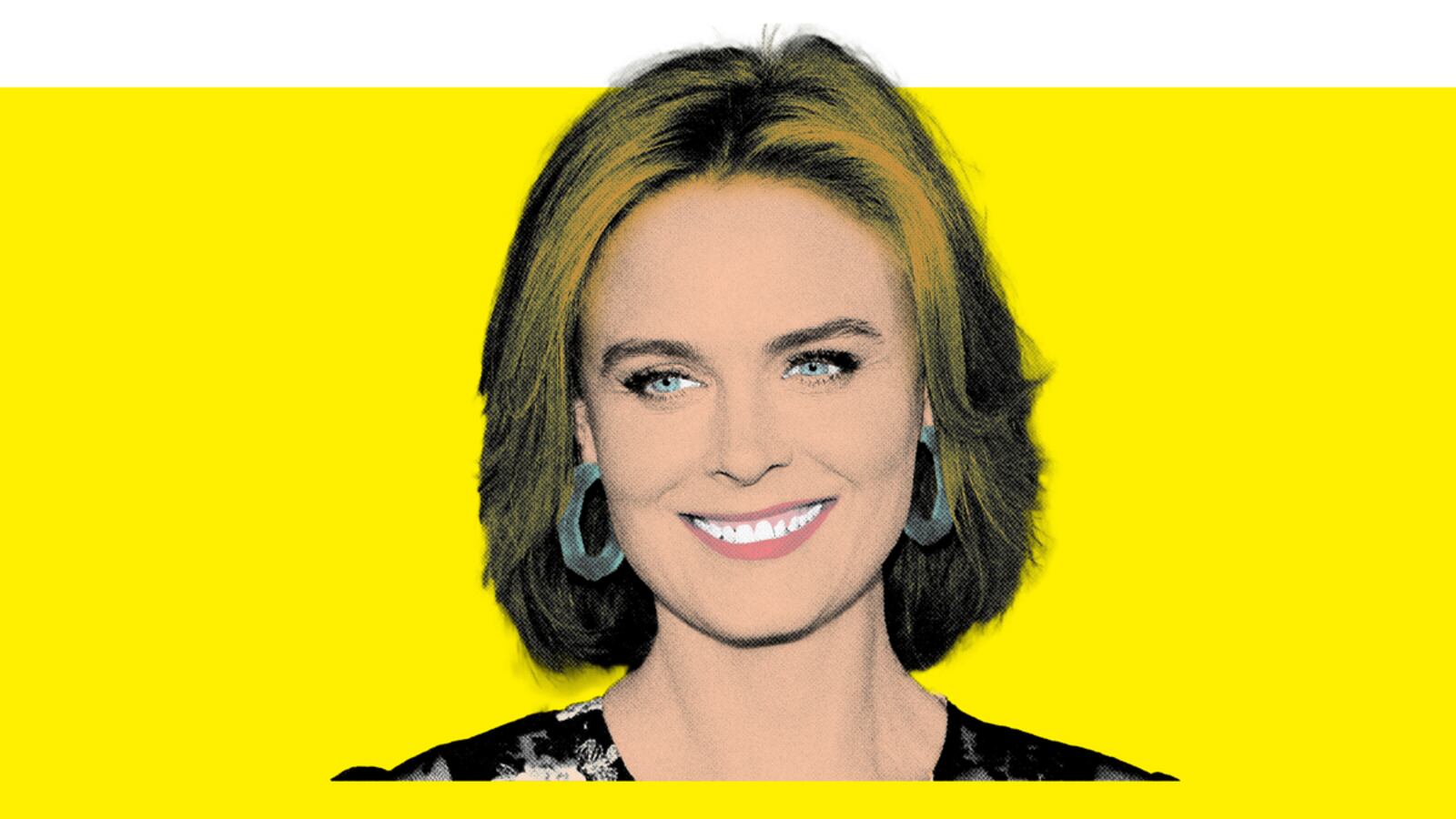Emily Deschanel doesn’t know why Hollywood has continued to tap her to play doctors, but she’s not about to start protesting now.
“I don’t know what screams ‘science’ about me, but I’ll take it,” she tells The Daily Beast’s Obsessed over Zoom with a laugh. “When I got the part on Bones, a friend of mine said, ‘Oh my gosh, that must be your dream role,’ knowing how much I loved learning about forensic science. … Science was my favorite subject when I was a kid, so I’m not going to argue with it. I enjoy it too.”
More than five years after wrapping up her 12-season run as forensic anthropologist Dr. Temperance Brennan on the beloved Fox procedural drama Bones, Deschanel has returned to television in Netflix’s Devil in Ohio, playing a hospital psychiatrist whose world is thrown into disarray when she decides to shelter a troubled teen escaping a satanic cult.
The role is a departure from the crime/procedural genre that has defined most of Deschanel’s career, which, after Bones, has included a guest spot as Nathan Fillion’s ex-wife in ABC’s The Rookie and a 12-episode arc as a recovering drug addict in TNT’s Animal Kingdom.
For Deschanel, things have a funny way of coming full circle. She first met Daria Polatin—the author, creator and showrunner of Devil in Ohio—in the mid-90s, when they were both studying acting at Boston University. They kept in touch after graduation but eventually lost contact, even if they continued to keep tabs on each other’s work from afar.
So when she was pitched the idea of starring in an eight-episode adaptation of Devil in Ohio last summer, Deschanel was intrigued both by the prospect of reuniting with her former college classmate and exploring what would compel her character, Dr. Suzanne Mathis, to commit “a huge ethical breach” with a patient named Mae (Madeleine Arthur) that puts the rest of her family at risk.
“Suzanne has some things that happened in her past that make her more susceptible to wanting to save someone like Mae,” Deschanel explains. “I think investigating where Mae comes from all stems from Suzanne’s past and trauma that she experienced herself, and the fact that she never fully dealt with what she experienced. … It’s almost as if Suzanne is trying to save herself through Mae, save her younger self from what she [had once] experienced.”
Deschanel was always one of Polatin’s first picks to bring Suzanne to life. “Emily has incredible emotional and intellectual intelligence that she brings to her roles, in addition to warmth and depth,” Polatin says. “The character of Suzanne is a doctor, a mother, a daughter and a survivor. Emily’s talent and range as an actor allows her to be all these parts of Suzanne.”
Polatin, whose other screenwriting credits include Jack Ryan and Heels, first began working on Devil in Ohio eight years ago, after hearing the true story of a psychiatrist in the Buckeye State who once took in a devil-worshiping teen. “I was fascinated by the idea of someone trying to escape a cult,” says the author-turned-showrunner. “I also love the dynamics of micro-communities. How do other people influence the way we talk, dress, think? And when you’ve grown up in an insular community, can you ever escape your past?”

The insulated nature of Mae’s upbringing was of particular interest to Deschanel, who quips that she has “watched every documentary about cults” that she can find, because she finds the psychology of these groups “really fascinating.” For the show, Polatin and her writers’ room used countless hours of research to create their own cult—down to inventing their history and ideology—and even wrote a manifesto to give to their heads of department.
Even as a self-proclaimed skeptic who doesn’t believe in the devil, Deschanel couldn’t help but feel “creeped out a little bit on set.” The fictional cult is unique because “they don’t have to recruit new members,” she explains. “They just breed them. They just birth new members, so it makes it harder to get information on those types of cults … because they’re less integrated into our daily lives, even less than other cults. They really keep to themselves; they don’t have that outside interaction.”
Regular viewers of Deschanel’s work might notice that some mannerisms have carried over to her performance in Devil in Ohio from certain past characters. For instance, when her character says something assertive in a professional setting (à la Bones’ Dr. Brennan), she will often tip her head slightly to the left with big eyes, almost daring her counterpart to disagree with her in a non-combative way.

While she concedes that Dr. Mathis shares a few professional similarities with Dr. Brennan, Deschanel says she elected to play the former because she felt “different enough” from the latter. “Once you do one character that you’re known for, you’re going to be thought of in that way. I think there are probably actors who want to be considered as doctors and people don’t think of them as doctors, and now I want people to think of me as [something] different than a doctor.”
Nevertheless, in conversation, Deschanel lights up at the first mention of Bones, which she lovingly describes as “the show that launched a thousand friendships.”
For 12 years, the actress played television’s favorite forensic anthropologist, who teams up with FBI Special Agent Seeley Booth (David Boreanaz) to help the Bureau investigate homicides by identifying too-far-gone human remains. With her literal, empirical view of the world complementing his deeply emotive, instinctive nature, Brennan and Booth became one of television’s all-time slow-burn romantic couples—so much so that the actors playing them worked with an acting coach every weekend for the first six seasons to develop the characters’ will-they-or-won’t-they dynamic.
Deschanel thinks mutual respect on and off the screen was the key to building her partnership with Boreanaz, who taught her the importance of setting a tone on set as the lead of a show. “He always treated me as an equal. He was a big star [on Buffy the Vampire Slayer and Angel], and I was coming from some indie films when we started doing the show, [but] he always treated me as if we were coming from the same place and with great respect, and we built a great friendship over time,” she says. “I miss him so much. I text with him here and there, and it’s been a while since I’ve seen him.”
What does she miss most about working with Boreanaz? “Our inside jokes,” Deschanel says before exclusively revealing one of their many inside jokes to The Daily Beast’s Obsessed. “He’d put a coffee stirrer inside the foam of the interrogation room,” she recalls with a laugh, “so that was always forever known as ‘coffee corner.’ There are just different things that are just really hard to translate … but I guess [I miss] laughing with him on set and him making fun of me maybe. I enjoyed it all.”

Apart from Boreanaz, Deschanel says she is still “texting with different Bones people every week.” She is still close with Michaela Conlin and Tamara Taylor (“We did some amazing cocktail Zooms during the pandemic, and we’re trying to get together,” she reveals with a smile), and recently caught up with a few of the actors who played a rotating group of interns at the fictional Jeffersonian Institute (Pej Vahdat, Eugene Byrd, Carla Gallo, Ignacio Serricchio). The former castmates continue to marvel at how Bones has, in the 17 years since the series premiere, inspired a generation of young women (and men!) to pursue a career in science.
“With Brennan, I never thought [the show] would last as long as it did,” Deschanel admits. “[But] I thought hard about what characters I was putting into people’s living rooms, and I thought about how young girls would be watching it. And being a feminist and always wanting to inspire girls, I loved the fact that the character was in STEM, was unapologetically a genius, and made more money than the men in her life and wasn’t going to bat an eyelash about it.”

Going forward, Deschanel’s professional plans are simple: She wants to tackle projects that will make audiences see her in a new light. “I’d love to do a comedy or two,” she says with a hearty laugh, “and play characters that are really different … so I’m not necessarily looking for anything in particular.”
(When asked if she would like to appear in Yellowjackets opposite her good friend Melanie Lynskey, whom she met on the set of Stephen King’s Rose Red, Deschanel hardly misses a beat: “I would love to work with Melanie! I’m just so excited for her, and it just feels like such a long time coming [that] people are really recognizing her talent. That makes me teary-eyed to think about.”)
Having also worked as a producer and director on Bones, Deschanel says she has been using those experiences to develop projects behind the camera—even if, she admits, producing takes a long time. “Without getting into specifics, a project that I’m trying to get off the ground is a story about a group of women fighting for freedom,” she adds. “I think there’s always going to be a feminist slant to things that I’m attracted to as well.”







